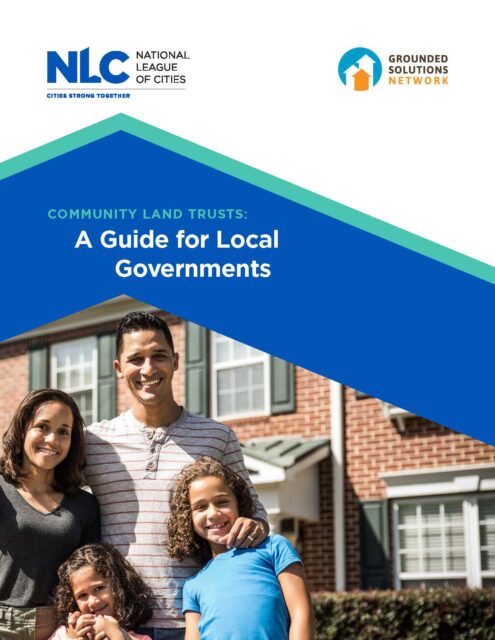Community Land Trusts: A Guide for Local Governments, a report from National League of Cities and Grounded Solutions Network, offers an introduction to the community land trust (CLT) model for housing, sheds light on the benefits CLTs bring to both residents and cities, and highlights key ways that municipal governments and local leaders can initiate or support CLTs in their communities.
Key takeaways from the report include:
- Community Land Trusts leverage one-time public investments for long-term gains in affordable housing: By balancing wealth accumulation for an individual homeowner with ongoing affordability needs of the community, CLTs serve generations of homeowners and help cities exit the revolving door of subsidies for affordable housing.
- CLTs can help close the homeownership gap: By targeting low-income households and giving communities of color greater access to the wealth-building opportunity of homeownership, community land trusts can also be a powerful tool for advancing racial equity.
- CLT homeownership often serves as a stepping-stone to more traditional, market-rate homeownership: CLT homeowners accumulate approximately $14,000 in equity when they sell their home, and almost 60 percent go on to purchase a market-rate home after selling.
- CLTs help stabilize homeownership through stewardship and community engagement: CLT homeowners were 10 times less likely to be in foreclosure proceedings and eight times less likely to be seriously delinquent than homeowners across all incomes in the private market during the 2008-10 housing crisis.
- The stewardship conducted by CLTs furthers stability and equity in the community at large: By ensuring lasting affordability, community control and stewardship over land helps to reduce absentee ownership, resist processes of gentrification and displacement, and enables cities to better weather economic downturns.
- As cities look to recover from COVID-19, there is a prime opportunity to rebuild more equitably than before — and community land trusts have the potential to efficiently, justly, and effectively address the longstanding affordable housing needs that many cities have faced for decades.

